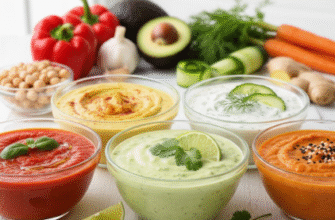Feeling drained after a demanding workout, a stressful week, or just the general hustle and bustle of life? What you eat plays a massive role in how quickly and effectively your body bounces back. Think of food as the essential building blocks and fuel needed to repair tissues, replenish energy stores, and get you feeling revitalized. Choosing the right nutrients can make a significant difference in your overall sense of well-being and readiness to tackle the next challenge, whatever it may be. It’s not about complicated diets or restrictive eating; it’s about making smart, nourishing choices to support your body’s natural recovery processes.
Recovery isn’t just for elite athletes. Every single one of us puts demands on our bodies daily, whether physical or mental. Proper nutrition helps manage the minor wear and tear, supports immune function, and keeps energy levels stable. Neglecting recovery nutrition can lead to feeling perpetually sluggish, increase susceptibility to minor aches, and generally dampen your vitality. By focusing on whole, nutrient-dense foods, you provide your system with the tools it needs to mend, refuel, and function optimally. This foundation of good nutrition supports resilience, helping you navigate daily stresses more effectively.
Powering Up with Protein
Protein is often hailed as the king of recovery nutrients, and for good reason. It provides the amino acids necessary for repairing and rebuilding muscle tissue, which undergoes stress not just from exercise but also from daily activities. Even if you’re not hitting the gym hard, adequate protein intake supports the maintenance of lean body mass, which is crucial for metabolism and overall strength. It also plays a role in enzyme production and immune function, both vital components of feeling your best.
Aim to include a source of quality protein in most of your meals and snacks, especially during periods when you feel you need extra support. Excellent sources include:
- Lean Meats: Chicken breast, turkey, lean cuts of beef or pork provide complete proteins.
- Fish: Salmon, tuna, mackerel, and sardines are rich in protein and also offer beneficial omega-3 fatty acids.
- Eggs: A versatile and highly bioavailable protein source.
- Dairy: Greek yogurt, cottage cheese, milk, and cheese contribute protein and calcium.
- Legumes: Beans, lentils, chickpeas, and peas are fantastic plant-based protein options, also rich in fiber.
- Tofu and Tempeh: Soy-based products offering complete plant protein.
- Nuts and Seeds: Almonds, walnuts, chia seeds, hemp seeds, and pumpkin seeds add protein, healthy fats, and micronutrients.
Varying your protein sources ensures you get a wider range of amino acids and other beneficial nutrients that come packaged with them. Spreading protein intake throughout the day is generally considered more effective for muscle protein synthesis than consuming a large amount in one sitting.
Refueling with Complex Carbohydrates
Carbohydrates often get a bad rap, but they are the body’s preferred source of energy. After exertion or periods of high energy demand (even mental exertion counts!), your glycogen stores – the stored form of carbohydrates in muscles and liver – become depleted. Replenishing these stores is critical for restoring energy levels and preparing your body for future activity. Without adequate carbohydrates, you might feel fatigued, mentally foggy, and find subsequent efforts much harder.
The key is to focus on complex carbohydrates rather than simple sugars found in processed snacks and sugary drinks. Complex carbs are digested more slowly, providing sustained energy release and preventing the rapid blood sugar spikes and crashes associated with simple sugars. They also come bundled with fiber, vitamins, and minerals.
Excellent sources of complex carbohydrates include:
- Whole Grains: Oats, quinoa, brown rice, barley, whole-wheat bread, and pasta.
- Starchy Vegetables: Sweet potatoes, potatoes (with skin), butternut squash, corn, and peas.
- Fruits: Bananas, berries, apples, oranges – provide carbs along with vitamins, minerals, and antioxidants.
- Legumes: Beans, lentils, and chickpeas are great sources of both carbs and protein.
Timing can be beneficial. Consuming carbohydrates alongside protein within a reasonable timeframe after significant exertion can optimize glycogen replenishment and muscle repair simultaneously. However, for general wellness and recovery from daily life, consistently including complex carbs in your balanced meals throughout the day is the most important strategy.
The Role of Healthy Fats
Fats are essential for overall health and play a specific role in recovery. Healthy fats, particularly unsaturated fats like omega-3 fatty acids, are crucial for cell membrane health, hormone production, and managing inflammation. While some inflammation is a natural part of the repair process, chronic or excessive inflammation can hinder recovery and contribute to feeling unwell. Including sources of anti-inflammatory fats can help modulate this response.
Focus on incorporating these sources of healthy fats:
- Fatty Fish: Salmon, mackerel, herring, sardines are packed with EPA and DHA omega-3s.
- Avocados: Rich in monounsaturated fats, fiber, and potassium.
- Nuts: Walnuts (especially good for omega-3s), almonds, pecans, cashews.
- Seeds: Chia seeds, flaxseeds (ground for better absorption), hemp seeds, pumpkin seeds.
- Olive Oil: Extra virgin olive oil is a staple of healthy diets, rich in monounsaturated fats and antioxidants.
While fats are energy-dense, they are vital for absorbing fat-soluble vitamins (A, D, E, K) and contribute to satiety, helping you feel full and satisfied after meals. Avoiding processed foods high in unhealthy trans fats and excessive saturated fats is just as important as including healthy ones.
Vitamins and Minerals: The Unsung Heroes
While protein, carbs, and fats provide the macronutrient foundation, vitamins and minerals are the essential catalysts for countless bodily processes involved in recovery and general wellness. They act as coenzymes and building blocks for everything from energy production to immune defence and tissue repair.
Some key micronutrients to be mindful of for recovery include:
- Vitamin C: A powerful antioxidant that supports immune function and is essential for collagen synthesis (important for skin, tendons, ligaments). Found in citrus fruits, berries, bell peppers, kiwi, broccoli.
- B Vitamins (Thiamine, Riboflavin, Niacin, B6, B12, Folate): Crucial for converting food into energy, red blood cell formation, and neurological function. Found in whole grains, lean meats, eggs, legumes, leafy greens, nutritional yeast.
- Zinc: Plays a vital role in immune function, wound healing, and protein synthesis. Found in oysters, red meat, poultry, beans, nuts, whole grains.
- Magnesium: Involved in over 300 enzymatic reactions, including muscle contraction and relaxation, nerve function, and energy production. Found in leafy green vegetables, nuts, seeds, whole grains, legumes.
- Potassium: An electrolyte essential for fluid balance, nerve signals, and muscle contractions. Found in bananas, sweet potatoes, spinach, beans, yogurt.
- Iron: Crucial for oxygen transport in the blood; deficiency leads to fatigue. Found in red meat, poultry, fish, lentils, spinach (best absorbed with Vitamin C).
Eating a varied diet rich in fruits, vegetables, whole grains, lean proteins, and healthy fats is the best way to ensure you’re getting a broad spectrum of these vital micronutrients. Relying on whole foods over supplements is generally preferred for obtaining these nutrients in their natural, synergistic forms.
Focus on Nutrient Synergy: Your body doesn’t use nutrients in isolation. Protein needs carbohydrates for optimal use in muscle repair, and healthy fats help absorb certain vitamins. Aim for balanced meals that combine different food groups. This holistic approach ensures your body gets the full range of tools it needs for efficient recovery and sustained energy throughout the day. Consistency is more important than perfection for long-term wellness.
Hydration is Key
Never underestimate the power of water! Dehydration is a major roadblock to effective recovery. Water is essential for nearly every bodily function, including transporting nutrients, regulating body temperature, lubricating joints, and flushing out metabolic waste products. Even mild dehydration can lead to fatigue, headaches, muscle cramps, and impaired cognitive function, all of which hinder your ability to feel recovered and energized.
Aim to sip water consistently throughout the day. Don’t wait until you feel thirsty, as thirst is often a sign that dehydration has already begun. Monitor your urine color – pale yellow usually indicates good hydration. While plain water is best, other fluids contribute too:
- Herbal Teas: Unsweetened options like peppermint, chamomile, or ginger tea can be hydrating and offer additional soothing benefits.
- Milk: Provides hydration along with protein, calcium, and electrolytes.
- Diluted Fruit Juice: Use sparingly due to sugar content, but a small amount diluted with water can provide fluids and some carbohydrates/electrolytes.
- Water-Rich Foods: Fruits like watermelon, cucumber, celery, and oranges have high water content and contribute to overall hydration.
Be mindful of excessive caffeine and alcohol, as they can have diuretic effects. Ensuring adequate fluid intake is a simple yet profoundly effective strategy for supporting recovery and overall vitality.
Simple Recovery Snack & Meal Ideas
Putting these principles into practice doesn’t need to be complicated. Here are some easy ideas combining key recovery nutrients:
- Post-Activity Snack: Greek yogurt topped with mixed berries and a sprinkle of chia seeds (Protein, Carbs, Healthy Fats, Vitamins, Fiber).
- Quick Breakfast: Oatmeal made with milk or water, topped with sliced banana, walnuts, and a dash of cinnamon (Complex Carbs, Protein, Healthy Fats, Potassium, Fiber).
- Easy Lunch: A large salad with mixed greens, grilled chicken or chickpeas, quinoa, avocado, bell peppers, and a light vinaigrette (Protein, Complex Carbs, Healthy Fats, Vitamins, Minerals, Fiber).
- Comforting Dinner: Baked salmon served with roasted sweet potato wedges and steamed broccoli (Protein, Omega-3 Fats, Complex Carbs, Vitamins A & C, Fiber).
- Hearty Soup: Lentil soup packed with vegetables like carrots, celery, and spinach (Plant-based Protein, Complex Carbs, Fiber, Vitamins, Minerals).
- Recovery Smoothie: Blend spinach, a scoop of protein powder (optional), half a banana, almond milk, and a tablespoon of almond butter (Protein, Carbs, Healthy Fats, Vitamins, Minerals).
Listen to your body’s hunger and fullness cues. The goal is to consistently nourish yourself with whole, minimally processed foods that provide the building blocks for repair and the fuel for energy. Adapting these ideas to your preferences and dietary needs makes healthy eating sustainable and enjoyable.
Ultimately, supporting your body’s recovery through nutrition is an investment in your overall wellness. By focusing on adequate protein, complex carbohydrates, healthy fats, essential vitamins and minerals, and proper hydration, you provide the resources needed to bounce back from daily stresses, maintain energy levels, and feel your best. It’s about making conscious choices to fuel your body effectively, day in and day out.








